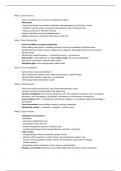Week 1: Team Theories
- Teams are effective: task, structure, leadership & support
- IMOI model
- input: team design (composition, leadership, interdependence), task factors, context
- mediator: team processes, emergent states (cohesion; task or interpersonal)
- output: performance, affective, learning
- Pooled, sequential, reciprocal interdependence
- Additive, disjunctive, conjunctive, discretionary task type
Week 2: Team Membership
- Formal, identified, emergent membership
(team staffing: task analysis, candidate members, best mix of candidates) (collective team
identification) (centralized, dense or fragmented; subgroups: knowledge-based, resource-based or
identify-based)
- Membership model divergence -> Transactive memory -> Performance
- Bad member: social loafing & free riding Good member: SIT & self-categorization
- Expectancy value theory; collective effort model
- Motivation gains: social compensation, Kölher effect
Week 3: Team Composition
- Surface level & deep level attributes
- ABC’s of teamwork (affective state, behavioral processes, cognitive state)
- Diversity (differentiation, dispersion, concentration)
- CEM (categorization elaboration model)
Week 4: Team Dynamics
- Micro (turn taking in discussions), meso (team development), macro
- Forming, storming, norming, performing, adjourning
- Member socialization (meso-macro): prospector, new, full, marginal, ex member; entry, acceptance,
divergence, exit; investigation, socialization, maintenance, resocialization, remembrance
- Team coaching (effort -> motivational, performance strategies -> consultation, skills and knowledge ->
educational)
- Team interventions (team building, training, coaching, leadership)
- Membership change (-> disruption -> adaption -> performance)
Week 5: Types of Teams
- Challenges of virtual teams:
- leadership
- planning & establishing norms
- psychological safety and trust
- conflict management (process, relational, task)
- matching technology to the message (lifecycle, sensitivity, complexity)
- Project teams;
- conceptualization; client consultation, project mission
- planning; client acceptance, project mission, top management support, urge
- execute; client consultation, project mission, technical tasks, project plans/ schedule,
trouble shooting
- termination; client consultation, project mission, technical tasks
- Strategic core members (experience, job related skills) (lead developer & junior developer)





